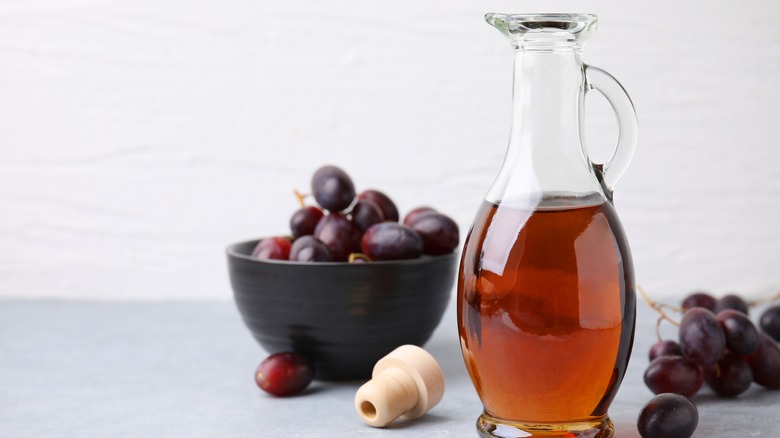The 2 Ingredients You Need To Substitute For Red Wine Vinegar
There are few things more frustrating than going into your kitchen to prepare a recipe you've been planning to make all day, only to find out that you're missing a key ingredient. For myriad reasons, going to the store to get it seems impossible. It only gets worse when you start searching your cabinets for a suitable replacement and find you're missing the substitutes as well. If the ingredient you're missing is red wine vinegar, there's no need to panic. Almost everyone has two ingredients right in their pantry needed to solve that particular dilemma: a bottle of red wine and a bottle of white vinegar.
Combining red wine and white vinegar as a substitute for red wine vinegar is sort of a no-brainer, since one could argue that red wine as a main ingredient for red wine vinegar is key to the fermentation process for the latter. A bacteria called acetobacter turns the alcohol from the wine into acetic acid, which gives the vinegar its slightly sour or bitter taste. The full flavor of red wine vinegar comes from the different wines used in the process, giving the vinegar tart and tannic flavors, while others are fruiter and tangier. Aging can also affect the flavor of the vinegar. More expensive red wine vinegars can be aged in wood casks for up to two years.
Other vinegars may work as a substitute
Making your red wine vinegar substitute is easy: Just combine half the amount needed of red wine with the other half of white vinegar. After whisking the two liquids together, let them sit for as long as you can to let the flavors meld. You can use any type of red wine you may already have open or choose a varietal you like, depending on the flavor of the dish. For something delicate and light, go with a pinot noir. For a strong, fruity flavor, select a zinfandel or other full-bodied wine.
With so many different types of vinegar available, you might be inclined to just sub another one in. It's not that simple. White wine vinegar will give you the light consistency you want, but you will get the more subtle flavors imparted in white wine versus red. Red wine vinegar also gives dishes a tinge of red or pink you won't get from white wine vinegar. Champagne vinegar will add a slightly sweet taste, while rice wine vinegar might be too acidic.
Although not a wine vinegar, balsamic vinegar might seem like a simple substitute since it is made from whole grapes. But where red wine vinegar is light with a subtle red-to-pink cast, the tartness of balsamic vinegar is stronger, and it has a richer, thicker consistency and a dark, nearly black color. While you could certainly use balsamic vinegar as a substitute in salad dressings, the flavor and texture may be too strong for certain dishes like sweet-and-sour cabbage. The great news is you don't have to substitute. The simple solution of red wine and white vinegar is probably right behind your cabinet door.

